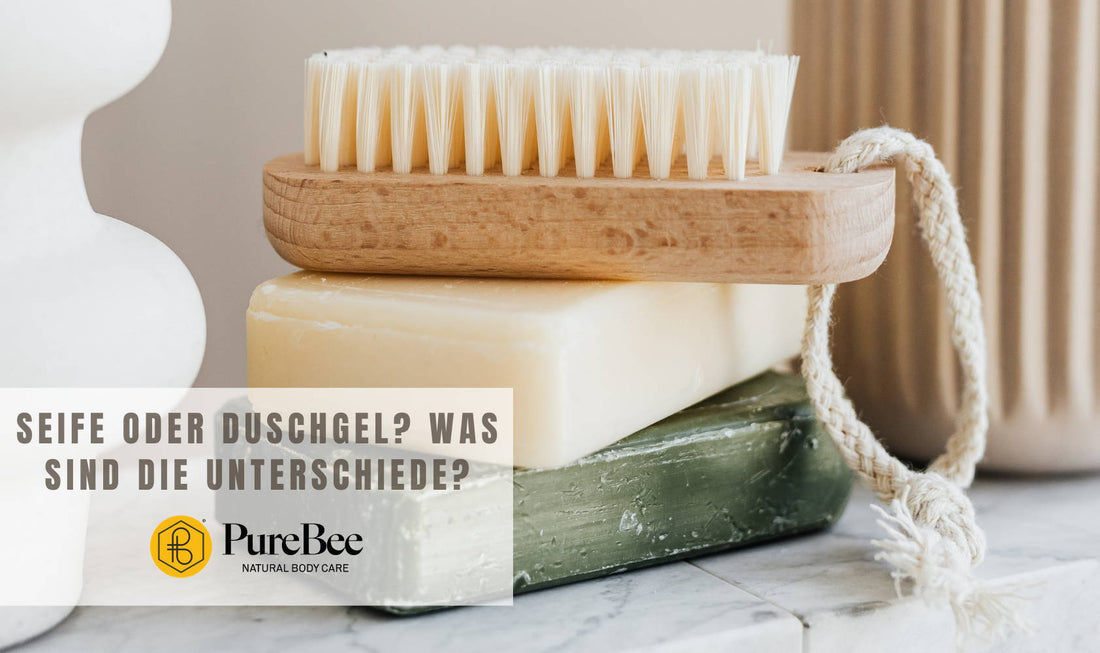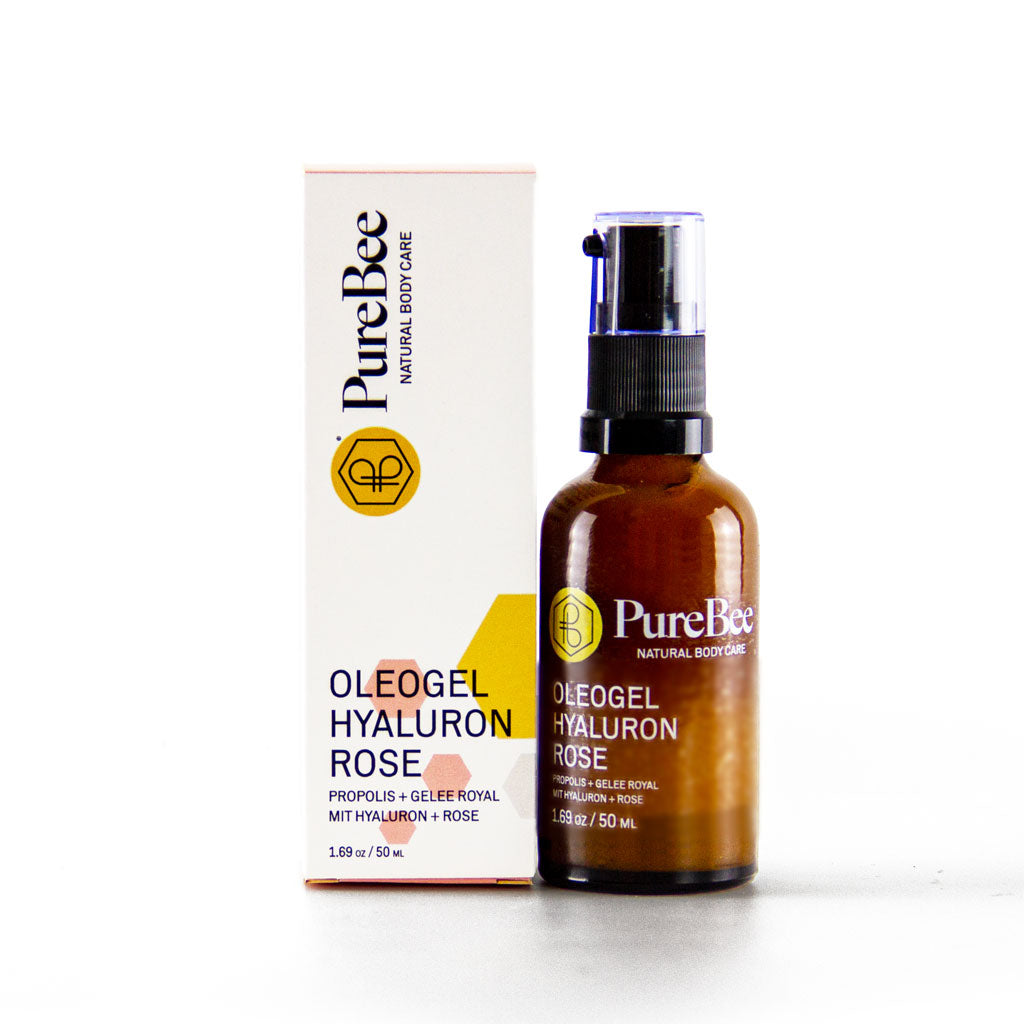
soap or shower gel? liquid or solid? What is better?
Share
What is the difference between shower gel and soap?
The obvious difference between liquid shower gel and soap is clearly the usage. Solid shower gel and soaps are one piece and liquid shower gel, as the name suggests, is liquid.
Shower gels still find their place in most bathrooms. You can find the cleaners in all sorts of shapes and colors. They come in the most unusual scents and promise a wide variety of properties. The main components of the gels are water, (chemical) surfactants and glycerin (sugar alcohol). In addition, there are usually fragrances, colorings and preservatives. And unfortunately, microplastic particles are often hidden in conventional shower gels, which get into our waters unhindered. Acids ensure that the shower gels reach a skin-neutral pH value (5.5). Most people like shower gel because it foams up a lot when they wash, giving them the misleading feeling that it only really gets clean afterwards. However, many shower gels dry out the skin due to the bad ingredients. Another obvious downside is that shower gel almost always comes in plastic packaging and more often than not, more product is used than is actually needed.
For some time now, solid shower gels have also become more and more common. Is solid shower gel something of a cross between shower gel and soap? No. Solid shower gel is simply shower gel that has had its water removed. So the ingredients remain the same. One advantage, however, is that solid shower gel comes with environmentally friendly packaging.
Soaps, on the other hand, consist of the basic ingredients fat and lye. Then there are different combinations of oils and active ingredients that determine the care level of the soap. Our natural soaps do not contain any added surfactants, are completely natural and consist only of oils, beeswax, lye and natural active ingredients such as honey and propolis. In contrast to shower gels, soaps are slightly alkaline. Our soaps have a pH value of approx. 9. This is not a problem, however, because healthy skin compensates for this shortly after showering. In any case, the alkaline pH value is less harmful to the skin than bad ingredients in many shower gels.
Important: Always look closely at the ingredients of soaps. Although only ingredients of natural origin should be used in natural soaps, i.e. free from microplastics, surfactants, sulfates, parabens and petroleum or other mineral oils, the term “natural soap” is not protected. Therefore, even with “natural soap” you have to make sure that everything in it is really natural. Unfortunately, many producers do not take the pigments very seriously, for example, and use chemical colors to make the soaps shine. Since we want to keep our natural soaps natural, we have decided against artificial coloring agents. All our soaps are therefore colored with mineral pigments or earth tones. These natural pigments are obtained through the extraction and separation of minerals and they enable us to let our different types of soap shine in different colors. However, if you want to do without color completely, you can use our Original hand and body soap.
We also recommend that you make sure that the solid shower gel or soap is palm oil-free. You don't have to worry about this with all PureBee soaps. We do not process palm oil in any.
Soaps do not foam as much as shower gels because of the lack of artificial surfactants. If you don't want to miss your foam party, why not try a soap bag? So the soap foams more and at the same time you have a peeling effect. You can also let the soap dry in the soap bag afterwards. But soap dishes or soap magnets are also suitable for drying.
Most natural soaps still have one difference to the curd soap that you might remember from grandma: they are over-fat. Our hand and body soaps are superfatted at 7%. The superfatting is the part of the oils in the soap that is not saponified. With our soap, this is just 7% of the oils used. Excess fat is very important, especially with hand and body soap, as it cares for the skin and protects it from drying out.
In addition, soap is more environmentally friendly because it is completely plastic-free. Even microplastics have no place in real natural soaps. And a nice side effect: If you travel by plane, you have more space for other things in your travel bag for the liquids.
Conclusion: Which is better, shower gel, solid shower gel or soap?
This question cannot be answered quite so easily or in general terms. All products have their advantages, but also their disadvantages.
Shower gel is easier to store and use. We often find shower gel to be more hygienic, especially when friends and family stay over and want to use our shower gel. However, most shower gels are packaged in plastic bottles and often contain ingredients such as SLS, preservatives or microplastics that are not good for the skin and the environment. Also, the main ingredient in shower gels is always water, which we don't really want to spend a lot of money on.
The solid structure makes it easier to dose solid shower gel and soap. As a result, the pieces usually last longer than liquid shower gel. When storing wet soap or solid shower gel, however, you have to be careful and let the soap dry in a soap dish or attached to a soap magnet so that no bacteria can form.
Since solid shower gel is actually only shower gel without water, you only pay for ingredients and not for water. But the ingredients can be the same as regular shower gel. In addition to SLS, preservatives, microplastics or silicones are often found in them.
Real natural soap, on the other hand, is purely natural and does not contain any artificial foam enhancers or microplastics.
No matter which product you choose in the end, it is important that you always pay attention to the list of ingredients.
We hope that our post has given you a better understanding of soap vs. shower gel.

